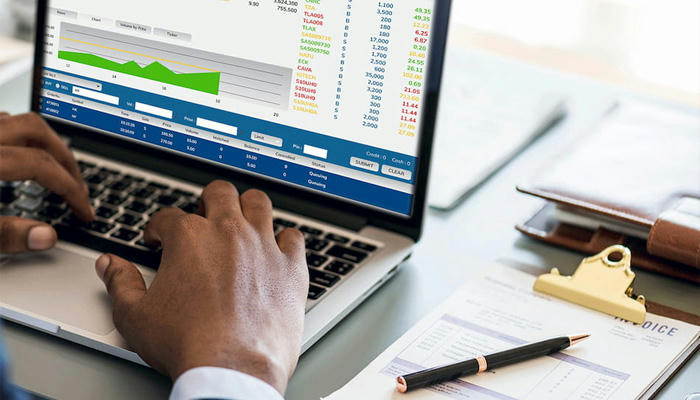Master Accounting from Home: Your Ultimate Online Course Guide
Master Accounting from Home: Your Ultimate Online Course Guide

Thinking about a career in accounting but can't commit to traditional classroom settings? Technology now allows you to pursue an online accounting course from home. This guide will walk you through everything you need to know about online accounting courses and how they can help advance your career.
What’s Involved in an Online Accounting Course?
An online accounting course is a digital learning program that lets you study accounting and finance through online lessons and modules. These courses offer the same quality of education and skill-building as traditional classes, but with the added benefits of flexibility and convenience. You can learn from anywhere and at any time, making it easier to fit your studies into a busy schedule.
Why Choose an Online Accounting Course?

Here’s why an online accounting course might be the perfect fit for you:
Flexible Learning: Online courses allow you to learn at your own pace, fitting your studies around your personal and professional life. Whether you’re working full-time or managing other commitments, you can tailor your study schedule to suit your needs.
Convenience: Study from anywhere with an internet connection. Whether you're at home or traveling, you can access course materials, lectures, and assignments without needing to commute or relocate.
Cost Savings: Online accounting programs are often more budget-friendly compared to traditional college courses. You save on expenses such as commuting, accommodation, and sometimes even textbooks, as many resources are provided digitally.
Up-to-Date Skills: Online courses are crafted by industry professionals, ensuring you gain the latest knowledge and skills relevant to today’s accounting practices. This means you’re learning current techniques and information that will be directly applicable to your career.
What Topics Are Covered in an Online Accounting Course?

In an online accounting course, you'll dive into various essential topics that provide a thorough understanding of finance and accounting. Here’s a breakdown of what you can expect to learn:
Accounting Fundamentals: Start with the basics, including the principles and concepts that underpin all accounting practices. This foundation will help you understand how financial transactions are recorded and reported.
Financial Statements: Learn how to prepare and analyze key financial statements, such as the balance sheet, income statement, and cash flow statement. These statements are crucial for assessing a company's financial health.
Taxation: Explore the principles of taxation, including how to prepare tax returns and understand tax regulations. This includes individual, corporate, and sales tax, giving you a comprehensive view of the tax landscape.
Auditing: Understand the processes and standards involved in auditing financial statements. You'll learn about the roles of auditors and how they ensure accuracy and compliance in financial reporting.
Managerial Accounting: Discover how to use accounting information for internal decision-making. This includes budgeting, performance evaluation, and cost analysis, which are key for effective management and strategy.
Cost Accounting: Delve into cost analysis methods to determine how costs are allocated and controlled within a business. This helps in pricing strategies and cost management.
Business Law: Gain insights into the legal aspects of business operations, including contracts, liability, and regulatory compliance. Understanding business law is essential for ensuring that accounting practices adhere to legal standards.
Economics: Learn the basics of economic principles and how they affect financial decisions and business environments. Topics might include supply and demand, market structures, and economic indicators.
How Long Will It Take to Finish an Online Accounting Course?

The time needed to complete an online accounting course depends on the type of program and its level. Here’s a general overview:
Certificate or Diploma Programs: These are typically shorter and can be finished in about 6 to 12 months. They are designed to provide you with fundamental accounting skills and knowledge quickly, ideal if you're looking to enter the field sooner.
Associate or Bachelor's Degree Programs: For those aiming for a more comprehensive education, these degree programs usually take between 2 to 4 years to complete. They offer a deeper dive into accounting principles and often include additional coursework in related areas.
Advanced Degrees: If you're pursuing a Master's or other advanced degrees in accounting, expect a longer commitment. These programs usually require 1 to 2 additional years of study beyond a bachelor's degree.
What Do You Need to Get Started with an Online Accounting Course?
Getting into an online accounting course depends on the program and school you choose. Here’s a general idea of what you might need:
Certificate or Diploma Programs: Usually, you need a high school diploma or an equivalent qualification. Some programs might not require specific prior coursework but having a basic understanding of math and English can be beneficial.
**Associate or Bachelor’s Degree Programs: **For these more advanced programs, you'll generally need a high school diploma with good grades, especially in subjects like math and English. Some colleges may also look for standardized test scores or other qualifications.
Advanced Degrees: If you’re aiming for a Master's or higher degree, you'll need to have completed a relevant undergraduate degree. Additional requirements might include work experience, standardized test scores, or a strong academic record.
Are Online Accounting Courses Recognized and Accredited?
Yes, many online accounting courses are accredited by reputable organizations. Accreditation is a key factor to consider when choosing a program, as it confirms the quality and recognition of the course. Here’s what you need to know:
Accreditation Bodies: Look for courses accredited by respected organizations like the Association to Advance Collegiate Schools of Business (AACSB) or the Accreditation Council for Business Schools and Programs (ACBSP). These bodies ensure that the course meets high educational standards and prepares you well for the accounting profession.
Quality Assurance: Accreditation means the course has been reviewed and meets specific criteria for academic excellence. This can include the curriculum, faculty qualifications, and overall program quality.
Employer Recognition: An accredited course is more likely to be recognized and valued by employers. It indicates that you have received education from a reputable program, which can enhance your job prospects and career advancement.
Career Paths After Completing an Online Accounting Course

Accountant: Handle financial records, prepare reports, and ensure compliance with regulations. Accountants work in businesses, government agencies, and non-profits.
Auditor: Examine financial statements and records to ensure accuracy and adherence to laws and regulations. Auditors may work internally within organizations or for external auditing firms.
Tax Specialist: Focus on preparing tax returns, advising on tax strategies, and ensuring compliance with tax laws. Tax specialists often work in accounting firms or as part of a company’s finance department.
Financial Analyst: Analyze financial data to help organizations make informed investment and business decisions. Financial analysts are employed by corporations, investment firms, and financial institutions.
Bookkeeper: Manage daily financial transactions, maintain accurate records, and prepare financial statements. Bookkeepers are essential for small businesses and can also work in larger organizations.
Budget Analyst: Develop and oversee budgets for organizations, ensuring financial resources are used effectively. Budget analysts typically work for government agencies, large corporations, or non-profits.
An online accounting course offers a flexible and accessible path to building a career in finance and accounting. It allows you to learn on your own schedule, making it easier to balance studies with work or other commitments. You can study from anywhere with an internet connection, eliminating the need for travel and reducing costs associated with traditional classes.
These courses provide the essential skills and knowledge needed for various accounting roles, such as bookkeeping, auditing, and financial analysis. With the increasing demand for qualified accounting professionals, enrolling in an online accounting course could be a smart move to advance your career and open up new opportunities. Start your journey in accounting today and explore the benefits of this convenient and cost-effective educational option.
